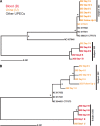Bacterial resistance to leucyl-tRNA synthetase inhibitor GSK2251052 develops during treatment of complicated urinary tract infections
- PMID: 25348524
- PMCID: PMC4291364
- DOI: 10.1128/AAC.03774-14
Bacterial resistance to leucyl-tRNA synthetase inhibitor GSK2251052 develops during treatment of complicated urinary tract infections
Abstract
GSK2251052, a novel leucyl-tRNA synthetase (LeuRS) inhibitor, was in development for the treatment of infections caused by multidrug-resistant Gram-negative pathogens. In a phase II study (study LRS114688) evaluating the efficacy of GSK2251052 in complicated urinary tract infections, resistance developed very rapidly in 3 of 14 subjects enrolled, with ≥32-fold increases in the GSK2251052 MIC of the infecting pathogen being detected. A fourth subject did not exhibit the development of resistance in the baseline pathogen but posttherapy did present with a different pathogen resistant to GSK2251052. Whole-genome DNA sequencing of Escherichia coli isolates collected longitudinally from two study LRS114688 subjects confirmed that GSK2251052 resistance was due to specific mutations, selected on the first day of therapy, in the LeuRS editing domain. Phylogenetic analysis strongly suggested that resistant Escherichia coli isolates resulted from clonal expansion of baseline susceptible strains. This resistance development likely resulted from the confluence of multiple factors, of which only some can be assessed preclinically. Our study shows the challenges of developing antibiotics and the importance of clinical studies to evaluate their effect on disease pathogenesis. (These studies have been registered at ClinicalTrials.gov under registration no. NCT01381549 for the study of complicated urinary tract infections and registration no. NCT01381562 for the study of complicated intra-abdominal infections.).
Copyright © 2015, American Society for Microbiology. All Rights Reserved.
Figures


Similar articles
-
DS86760016, a Leucyl-tRNA Synthetase Inhibitor with Activity against Pseudomonas aeruginosa.Antimicrob Agents Chemother. 2019 Mar 27;63(4):e02122-18. doi: 10.1128/AAC.02122-18. Print 2019 Apr. Antimicrob Agents Chemother. 2019. PMID: 30670430 Free PMC article.
-
In Vitro and In Vivo Activities of DS86760016, a Novel Leucyl-tRNA Synthetase Inhibitor for Gram-Negative Pathogens.Antimicrob Agents Chemother. 2018 Mar 27;62(4):e01987-17. doi: 10.1128/AAC.01987-17. Print 2018 Apr. Antimicrob Agents Chemother. 2018. PMID: 29437618 Free PMC article.
-
Comparative in vitro activities of GSK2251052, a novel boron-containing leucyl-tRNA synthetase inhibitor, against 916 anaerobic organisms.Antimicrob Agents Chemother. 2013 May;57(5):2401-4. doi: 10.1128/AAC.02580-12. Epub 2013 Mar 4. Antimicrob Agents Chemother. 2013. PMID: 23459482 Free PMC article.
-
A Polymorphism in leuS Confers Reduced Susceptibility to GSK2251052 in a Clinical Isolate of Staphylococcus aureus.Antimicrob Agents Chemother. 2016 Apr 22;60(5):3219-21. doi: 10.1128/AAC.02940-15. Print 2016 May. Antimicrob Agents Chemother. 2016. PMID: 26976861 Free PMC article.
-
Bacterial characteristics of importance for recurrent urinary tract infections caused by Escherichia coli.Dan Med Bull. 2011 Apr;58(4):B4187. Dan Med Bull. 2011. PMID: 21466767 Review.
Cited by
-
Exploiting evolutionary trade-offs for posttreatment management of drug-resistant populations.Proc Natl Acad Sci U S A. 2020 Jul 28;117(30):17924-17931. doi: 10.1073/pnas.2003132117. Epub 2020 Jul 13. Proc Natl Acad Sci U S A. 2020. PMID: 32661175 Free PMC article.
-
DS86760016, a Leucyl-tRNA Synthetase Inhibitor with Activity against Pseudomonas aeruginosa.Antimicrob Agents Chemother. 2019 Mar 27;63(4):e02122-18. doi: 10.1128/AAC.02122-18. Print 2019 Apr. Antimicrob Agents Chemother. 2019. PMID: 30670430 Free PMC article.
-
Optimization of Methionyl tRNA-Synthetase Inhibitors for Treatment of Cryptosporidium Infection.Antimicrob Agents Chemother. 2019 Mar 27;63(4):e02061-18. doi: 10.1128/AAC.02061-18. Print 2019 Apr. Antimicrob Agents Chemother. 2019. PMID: 30745384 Free PMC article.
-
Targeting evolution to inhibit antibiotic resistance.FEBS J. 2020 Oct;287(20):4341-4353. doi: 10.1111/febs.15370. Epub 2020 Jun 8. FEBS J. 2020. PMID: 32434280 Free PMC article. Review.
-
Epetraborole Is Active against Mycobacterium abscessus.Antimicrob Agents Chemother. 2021 Sep 17;65(10):e0115621. doi: 10.1128/AAC.01156-21. Epub 2021 Jul 19. Antimicrob Agents Chemother. 2021. PMID: 34280020 Free PMC article.
References
-
- Roberts RR, Hota B, Ahmad I, Scott RD, Foster SD, Abbasi F, Schabowski S, Kampe LM, Ciavarella GG, Supino M, Naples J, Cordell R, Levy SB, Weinstein RA. 2009. Hospital and societal costs of antimicrobial-resistant infections in a Chicago teaching hospital: implications for antibiotic stewardship. Clin Infect Dis 49:1175–1184. doi:10.1086/605630. - DOI - PubMed
-
- Hidron AI, Edwards JR, Patel J, Horan TC, Sievert DM, Pollock DA, Fridkin SK. 2008. NHSN annual update: antimicrobial-resistant pathogens associated with healthcare-associated infections: annual summary of data reported to the National Healthcare Safety Network at the Centers for Disease Control and Prevention, 2006–2007. Infect Control Hosp Epidemiol 29:996–1011. doi:10.1086/591861. - DOI - PubMed
Publication types
MeSH terms
Substances
Associated data
LinkOut - more resources
Full Text Sources
Other Literature Sources
Medical
Molecular Biology Databases

